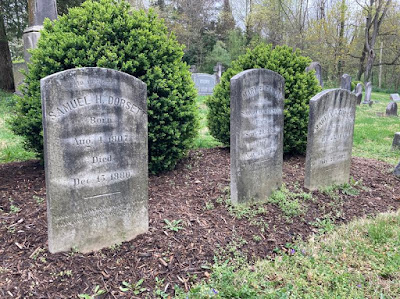 |
| Volunteers who tried to clean these old grave markers caused serious damage. Photo: Lilly Price/Capital Gazette |
A recent article in the Maryland Capital Gazette* shared the sad story of two well-meaning cemetery buffs who intended to clean headstones but ended up damaging them. Using harsh chemicals and steel wool, the amateur genealogists left markings like zebra stripes on hundreds of old and historic stone markers, some dating from the Civil War, in the cemetery of All Hallows Episcopal Church in Davidsonville, as well as another nearby graveyard. The cemetery committee estimates it will cost $10,000 to undo the damage.
The perpetrators were discovered when photos of the newly cleaned headstones appeared on the website BillionGraves.com. Contrite, one of the women who had unwittingly defaced the stones contacted the church, and she and her fellow volunteer had a cordial meeting with the cemetery committee. Ironically, a list of all the information the amateurs sought to uncover was already available; the committee keeps a detailed record of every grave at the site, including names, dates, and some causes of death.
Damage to cemeteries is a perennial problem, but it's especially sad when caused by people who love genealogy and intend to help. Today you can find ads on the Internet offering grave-cleaning materials, and some websites aimed at genealogists have even suggested that amateurs might want to turn this hobby into a side business. Do not do this without educating yourself! For several reasons:
1. You must have permission to clean any gravestone not associated with a family member. It is actually unlawful in some places to clean a grave marker without permission. Also, some cemeteries have rules about when and how to clean a gravestone. The U.S. National Cemetery System, for example, forbids cleaning markers on federal land unless the temperature is above 40 degrees Fahrenheit. For best practice, contact the cemetery office or other property owner for permission before undertaking to clean a headstone. They may also have tips and suggestions about cleaning methods appropriate for their cemetery.
2. Frequent cleaning contributes to the erosion of headstones. The wrong sort of cleaner can easily damage a headstone. Acidic cleaners such as vinegar can eat away at the stone. Never use strong chemicals such as bleach--they can soak into porous stone and form crystals that tear the stone apart from the inside out. Use only soft bristle brushes, never wire brushes or steel wool.
The group Cemetery Conservators For United Standards was formed a decade ago by a handful of "tombstone tourists" who revere cemeteries and want to preserve and protect them. They now have members all around the country. They sift the good information from the bad, and share tips on their website. They even offer classes for would-be conservators. Consulting this site or similar sources can help you plan appropriately before you set out to clean gravestones.
But always ask first.
*Thanks to Maureen Hanlon for bringing this story to our attention.
Copyright © 2021 by California Genealogical Society








1 comments:
A salutary warning for all! Thanks for sharing this as the newspaper article is not available in Europe.
Post a Comment